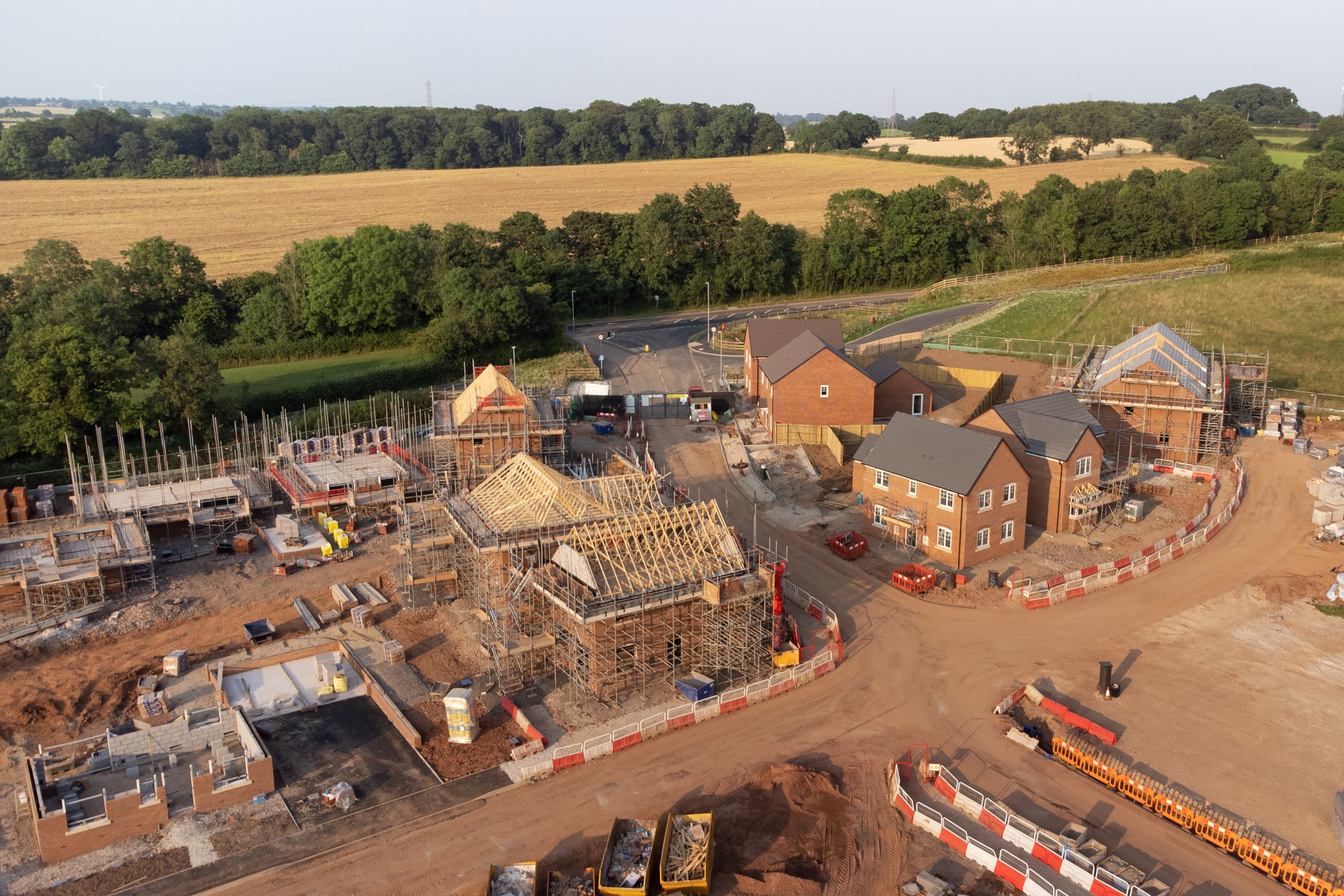Downing Institutional Property Development Report: Building Back Bigger

The first Downing LLP institutional property development report, ‘Building Back Bigger’ gauges the sentiment of 50 UK pension schemes, which collectively manage around £125.5bn. From increasing exposure to property development finance to a sharper focus on ESG, the report reveals a number of key trends and themes that will shape the future of the asset class in the years ahead.

At a top level, the findings clearly show that broad institutional adoption is set to continue apace. The quantitative analysis identifies that institutional investors are attracted to the maturing asset class due to its impressive risk-adjusted returns, diversification power, and environmental, social and governance (ESG) credentials.
The report shows that the number one driver for increased exposure to property development finance is access to attractive yields offered by the asset class. This feeds into what the report shows as a growing willingness by defined benefit (DB) pension funds and other institutional investors to invest in illiquid assets because of the premium yield they can offer.
Meanwhile, more investors are considering robust approaches to sustainability-related risks and the social utility value of ensuring an adequate supply of sustainable residential housing. And the survey results strongly reflect this growing recognition of the importance of responsible investing within the property sector.
Nine out of ten pension funds believe lending to support residential property developers will play an important role in helping DB pension schemes meet their ESG goals – with 32% of the respondents strongly agreeing with this statement.
The report also arrives during a time of elevated economic uncertainty. In the short term, there are challenges. The UK residential housing market must now brace itself for significant headwinds. Contributing to this, rising borrowing costs will add to the cost-of-living crisis and stretch affordability for property buyers.
Clearly, the mortgage market is shifting, and this will have some moderating effects on the housing market. The confluence of these economic challenges will create a stress test for the housing market, but will also exacerbate the need to address the gap in affordable residential housing through significant private and government capital investment.
Ultimately, the report shows that institutional capital is deepening its exposure to residential property development finance. And despite successive governments’ rhetoric about solving the housing crisis, a structural undersupply has created a compelling and vast annual addressable market of approximately £30bn.
What is abundantly clear from the report's findings is that property development finance is moving up the agenda for institutional investors.
To read the report and the full analysis, please download the report below.
The first Downing LLP institutional property development report, ‘Building Back Bigger’ gauges the sentiment of 50 UK pension schemes, which collectively manage around £125.5bn. From increasing exposure to property development finance to a sharper focus on ESG, the report reveals a number of key trends and themes that will shape the future of the asset class in the years ahead.

At a top level, the findings clearly show that broad institutional adoption is set to continue apace. The quantitative analysis identifies that institutional investors are attracted to the maturing asset class due to its impressive risk-adjusted returns, diversification power, and environmental, social and governance (ESG) credentials.
The report shows that the number one driver for increased exposure to property development finance is access to attractive yields offered by the asset class. This feeds into what the report shows as a growing willingness by defined benefit (DB) pension funds and other institutional investors to invest in illiquid assets because of the premium yield they can offer.
Meanwhile, more investors are considering robust approaches to sustainability-related risks and the social utility value of ensuring an adequate supply of sustainable residential housing. And the survey results strongly reflect this growing recognition of the importance of responsible investing within the property sector.
Nine out of ten pension funds believe lending to support residential property developers will play an important role in helping DB pension schemes meet their ESG goals – with 32% of the respondents strongly agreeing with this statement.
The report also arrives during a time of elevated economic uncertainty. In the short term, there are challenges. The UK residential housing market must now brace itself for significant headwinds. Contributing to this, rising borrowing costs will add to the cost-of-living crisis and stretch affordability for property buyers.
Clearly, the mortgage market is shifting, and this will have some moderating effects on the housing market. The confluence of these economic challenges will create a stress test for the housing market, but will also exacerbate the need to address the gap in affordable residential housing through significant private and government capital investment.
Ultimately, the report shows that institutional capital is deepening its exposure to residential property development finance. And despite successive governments’ rhetoric about solving the housing crisis, a structural undersupply has created a compelling and vast annual addressable market of approximately £30bn.
What is abundantly clear from the report's findings is that property development finance is moving up the agenda for institutional investors.
To read the report and the full analysis, please download the report below.
The first Downing LLP institutional property development report, ‘Building Back Bigger’ gauges the sentiment of 50 UK pension schemes, which collectively manage around £125.5bn. From increasing exposure to property development finance to a sharper focus on ESG, the report reveals a number of key trends and themes that will shape the future of the asset class in the years ahead.

At a top level, the findings clearly show that broad institutional adoption is set to continue apace. The quantitative analysis identifies that institutional investors are attracted to the maturing asset class due to its impressive risk-adjusted returns, diversification power, and environmental, social and governance (ESG) credentials.
The report shows that the number one driver for increased exposure to property development finance is access to attractive yields offered by the asset class. This feeds into what the report shows as a growing willingness by defined benefit (DB) pension funds and other institutional investors to invest in illiquid assets because of the premium yield they can offer.
Meanwhile, more investors are considering robust approaches to sustainability-related risks and the social utility value of ensuring an adequate supply of sustainable residential housing. And the survey results strongly reflect this growing recognition of the importance of responsible investing within the property sector.
Nine out of ten pension funds believe lending to support residential property developers will play an important role in helping DB pension schemes meet their ESG goals – with 32% of the respondents strongly agreeing with this statement.
The report also arrives during a time of elevated economic uncertainty. In the short term, there are challenges. The UK residential housing market must now brace itself for significant headwinds. Contributing to this, rising borrowing costs will add to the cost-of-living crisis and stretch affordability for property buyers.
Clearly, the mortgage market is shifting, and this will have some moderating effects on the housing market. The confluence of these economic challenges will create a stress test for the housing market, but will also exacerbate the need to address the gap in affordable residential housing through significant private and government capital investment.
Ultimately, the report shows that institutional capital is deepening its exposure to residential property development finance. And despite successive governments’ rhetoric about solving the housing crisis, a structural undersupply has created a compelling and vast annual addressable market of approximately £30bn.
What is abundantly clear from the report's findings is that property development finance is moving up the agenda for institutional investors.
To read the report and the full analysis, please download the report below.
The first Downing LLP institutional property development report, ‘Building Back Bigger’ gauges the sentiment of 50 UK pension schemes, which collectively manage around £125.5bn. From increasing exposure to property development finance to a sharper focus on ESG, the report reveals a number of key trends and themes that will shape the future of the asset class in the years ahead.

At a top level, the findings clearly show that broad institutional adoption is set to continue apace. The quantitative analysis identifies that institutional investors are attracted to the maturing asset class due to its impressive risk-adjusted returns, diversification power, and environmental, social and governance (ESG) credentials.
The report shows that the number one driver for increased exposure to property development finance is access to attractive yields offered by the asset class. This feeds into what the report shows as a growing willingness by defined benefit (DB) pension funds and other institutional investors to invest in illiquid assets because of the premium yield they can offer.
Meanwhile, more investors are considering robust approaches to sustainability-related risks and the social utility value of ensuring an adequate supply of sustainable residential housing. And the survey results strongly reflect this growing recognition of the importance of responsible investing within the property sector.
Nine out of ten pension funds believe lending to support residential property developers will play an important role in helping DB pension schemes meet their ESG goals – with 32% of the respondents strongly agreeing with this statement.
The report also arrives during a time of elevated economic uncertainty. In the short term, there are challenges. The UK residential housing market must now brace itself for significant headwinds. Contributing to this, rising borrowing costs will add to the cost-of-living crisis and stretch affordability for property buyers.
Clearly, the mortgage market is shifting, and this will have some moderating effects on the housing market. The confluence of these economic challenges will create a stress test for the housing market, but will also exacerbate the need to address the gap in affordable residential housing through significant private and government capital investment.
Ultimately, the report shows that institutional capital is deepening its exposure to residential property development finance. And despite successive governments’ rhetoric about solving the housing crisis, a structural undersupply has created a compelling and vast annual addressable market of approximately £30bn.
What is abundantly clear from the report's findings is that property development finance is moving up the agenda for institutional investors.
To read the report and the full analysis, please download the report below.

Please fill out the form to download the full report
Related Insights
View all2024 has laid the foundations for the UK housing market in 2025

2024 has laid the foundations for the UK housing market in 2025

Macroeconomic concerns drive institutional investors to specialist property development finance firms, Downing research shows

Macroeconomic concerns drive institutional investors to specialist property development finance firms, Downing research shows

Downing LLP does not provide advice or make personal recommendations and investors are strongly urged to seek independent advice before investing. Investments offered on this website carry a higher risk than many other types of investment and prospective investors should be aware that capital is at risk and the value of their investment may go down as well as up. Any investment should only be made on the basis of the relevant product literature and your attention is drawn to the risk, fees and taxation factors contained therein. Tax treatment depends on individual circumstances of each investor and may be subject to change in the future. Past performance is not a reliable indicator of future performance. Downing LLP is authorised and regulated by the Financial Conduct Authority (Firm Reference Number 545025). Registered in England No. OC341575. Registered Office: Downing, 10 Lower Thames Street, London, EC3R 6AF.








